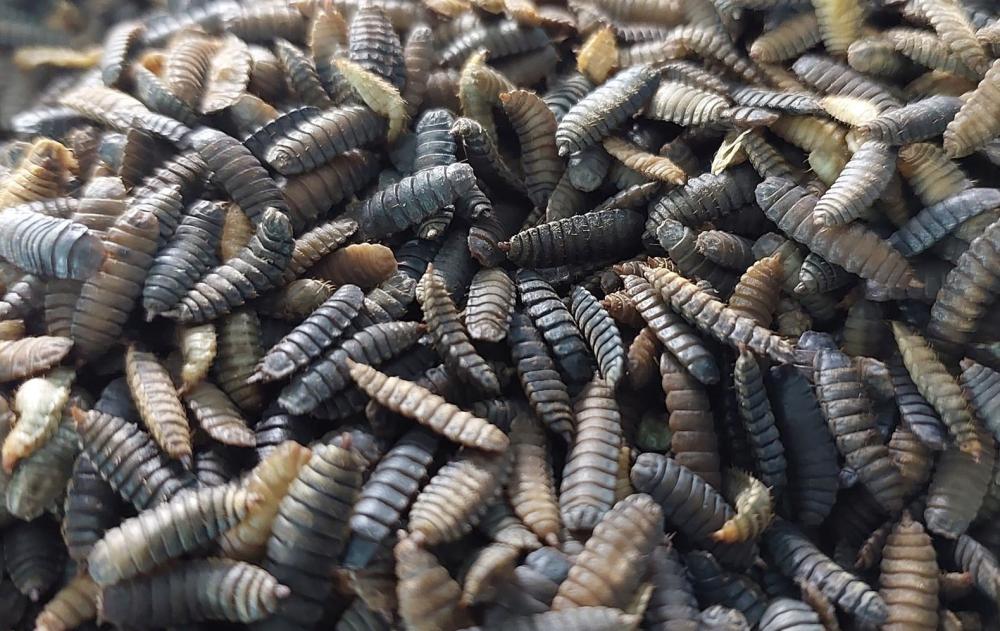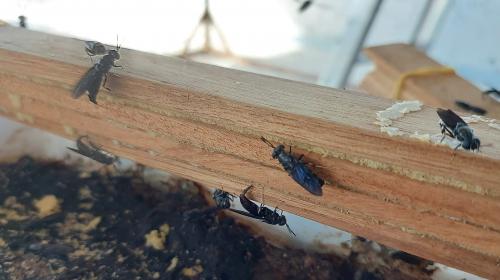As the global population grows, the demand for livestock products increases, but traditional livestock farming practices can have an environmental impact. The amount of land required for grazing, the large amounts of water and feed needed, and the greenhouse gas emissions associated with livestock farming contribute to deforestation, water scarcity, and climate change. Insects, on the other hand, have the potential to be a sustainable source of protein for human consumption and animal feed. They require significantly less land, water, and feed and their greenhouse gas emissions are much lower. Additionally, insects are rich in nutrients, such as protein and minerals, making them a promising alternative to traditional feed sources.
Despite the potential benefits of insect farming, this industry in Scotland, as well as in the UK, is still in its early stages and face challenges such as regulatory hurdles and societal stigmas. Therefore, it is crucial to explore the challenges and opportunities associated with insect farming to develop strategies for using insects as feed in Scotland. By examining the challenges and up-to-date regulations, this project seeks to identify opportunities for using insects as animal feed so we can work towards creating a more sustainable future for Scotland’s agriculture and food industries.
In Scotland (and the UK), the use of insects in animal feed is largely governed by EU regulations. In 2017, Regulation (EU) No 2017/893 permitted the feeding of seven insect species to aquaculture animals and possibly to farm in the UK and EU. These include the Black Soldier Fly (BSF) (Hermetia illucens), Common Housefly (Musca domestica), Yellow Mealworm (Tenebrio molitor), Lesser Mealworm (Alphitobius diaperinus), House Cricket (Acheta domesticus), Banded Cricket (Gryllodes sigillatus), and Field Cricket (Gryllus assimilis). This regulation also classified farmed insects as farm animals, meaning that farmers and businesses interested in insect farming or establishing an insect feed business must comply with the same regulations regarding rearing and breeding, feeding, and feed restrictions as traditional livestock. After Brexit, the EU added Silkworm (Bombyx mori) to the list of approved species in November 2021 under Regulation (EU) No 2021/1925. This change has not yet been implemented in Scotland, England, and Wales, since insects as feed fall under the authorisation of Food Standards Scotland (FSS) for Scotland and Food Standards Agency (FSA) for England and Wales. The slower progress and unclear regulations regarding insects for animal feed in the UK has caused the industry’s growth here to lag behind that of the EU and other regions, such as North America.

Image: Black Soldier Fly Larvae
Brexit has also had an impact, as the use of processed insect protein in animal feed for any farmed livestock intended for human consumption is still prohibited in the UK. However, the EU has removed unnecessary regulatory restrictions, known as “Feed Ban Rules,” to allow the use of processed insect protein in pig and poultry feed. This creates an uneven playing field between the EU and UK markets in terms of regulation. According to the World Wide Fund for Nature (WWF)’s report, this uncertain future for the insect sectors here is exacerbated by the fact that lifting regulations on using insect protein could lead to a demand of 540,000 tonnes of insect meal annually by 2050 from the country’s pig, poultry, and salmon sectors. Of this, around 240,000 tonnes of insect meal per year could be supplied by insect farms in the UK. This shift could reduce Scotland’s dependence on imports of soya and other protein sources, since currently our feed industry heavily relies on imports from both EU and non-EU countries. In addition to reducing import dependence, the increased production of insect meal could create more job opportunities locally.
While legislation and regulation issues continue to pose challenges for insect farming and feed industries across the UK, our project has revealed additional key challenges faced by insect farmers and feed businesses in Scotland and England. The primary challenge identified, in interviews with the sector, was the limited availability of information sources regarding insect farming, feed technology, and up-to-date regulations. However, informal networks such as a WhatsApp groups exist and key actors within these networks, who shared their personal experiences, were found to be of great importance in acquiring this information. In addition, feed businesses seem to conduct seminars within their companies to exchange knowledge with external experts.
The cost of feeding and breeding insects were also identified as major challenges. Transporting larvae was found to be costly and dried insects were preferred. However, dried insects are currently prohibited as feed for pigs and chickens in the UK. Interviewees highlighted the need for UK legislation to catch up with European legislation and emphasised the need for more black soldier fly larvae producers in Scotland to help the industry prosper.
Despite these challenges, the interviewees were positive about the potential of the insect industry to thrive in Scotland and the UK. They believed that the input of insect farmers, feed businesses, academic researchers, and policy makers across Scotland and the UK was crucial to driving the growth of this sector forward.
If you are interested in contributing to our research or learning more about our activities, please do not hesitate to contact us at lorna.pate@sruc.ac.uk. We would welcome your input too.
Pattanapong Tiwasing and Lorna Pate
Rural Policy Centre, SRUC
